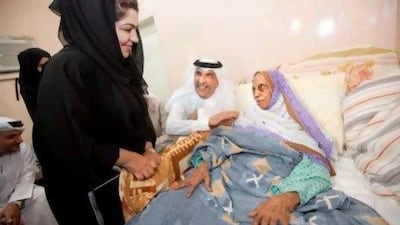DUBAI// More elderly people who live alone can expect companionship and social services in plans to double the capacity of a dedicated home-care programme.
The Weleef initiative serves 84 senior citizens in Dubai and the aim is to reach twice that number next year, said Khaled Al Kamda, director general of the Community Development Authority.
Mr Al Kamda describes Weleef as being like a community watchdog. Sitting by the bedside of Thabet Ahmed Al Sadi, who is retired from Dubai Police, he explained: "We look after him, we make sure there's no mistreatment. We see if his medication is taken, if there's anything he needs."
The programme provides services to elderly Emiratis in their homes, trains carers and pairs senior citizens with volunteers who visit regularly. "The most important issue is engaging volunteers from the younger generation," Mr Al Kamda said. As the elderly population grows and more women work outside the home, the paradigm of relatives caring for their elders is shifting, said Rima Sabban, assistant professor of sociology at Zayed University.
The CDA knows of more than 450 elderly people in Dubai who live alone or with domestic staff, Mr Al Kamda said.
In recognition of International Day for the Elderly, CDA officials visited Weleef participants at their homes. Maitha Khalfan Harib, in her seventies, lamented to them that her children did not visit her.
"They've always been surrounded by people," said Sayed Mohamed Al Hashmi, chief executive of corporate service at the CDA. "It kills them to be neglected."
Government involvement can push caregivers and relatives to shape up, he said. "When they see officials visiting and asking them, then they say, 'Let's look after our grannies'."
Bedridden but smiling, Mr Al Sadi basked in the attention from Mr Al Kamda and others. His wife Noura generously doled out welcomes. Asked her age, she demurred, explaining that she does not keep count.
And her husband joked: "I'm still 40!"
"It's like visiting a father or a mother, you know," Mr Al Hashmi said. "They feel they are not being neglected by the community. They treat us like their children."
As the visitors prepared to leave, Noura called across the room: "Thabet, say thank you for your visit!"
"Thank you for your visit!" Mr Al Sadi exclaimed.
Ms Sabban praised Weleef's recruitment of young volunteers, giving them an opportunity to understand the older generation.
"The way they need to look at the elderly is not as people who have expired in life," she said. "We need to look at them as people who have acquired knowledge of the place, they have wisdom, they have what we call in our culture baraka [blessing]."
An elderly man from Weleef visited one of Ms Sabban's college classes to speak to students. "The students were very positive to that and I saw a really great engagement of respect to this older man, though he was sometimes saying things that did not make sense for young people," she said.
"But still, they showed love to him, and this is what we need to build inside the family."

